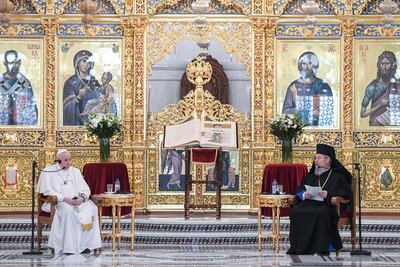Pope Francis may have arrived in Cyprus with messages of healing and unity, but before night fell on his first full day, recriminations erupted from the religious and political animosity on the divided island.
The pontiff urged Greek Cypriots and Turkish Cypriots to resume talks, saying threats and shows of force only prolong the “terrible laceration” the island’s people have endured for nearly 50 years.
On Friday, the Pope began the second day of his visit meeting with leaders of the Orthodox Church, the biggest Christian community on the island, who attacked Turkey for erasing elements of Christian culture in the occupied north.
Pope Francis is visiting only the predominantly Greek-Cypriot south of the island, controlled by the internationally recognised Cypriot government since the country split in two in 1974. The Turkish-backed state in northern Cyprus is recognised only by Ankara.
The leader of the breakaway Turkish Republic of Northern Cyprus, Ersin Tatar, accused the Cypriot government of “abusing religious beliefs” as the Pope landed on Thursday. He said the southern rivals had used the papal visit for political aims against Turkey and the TRNC. In his written statement, Mr Tatar invited Francis, “with most sincere feelings”, to visit the north.
“It is my hope and expectation that Pope Francis responds positively to our invitation and treats all believers on an equal basis, as he has repeatedly stated,” Mr Tatar said. “There are two different peoples in Cyprus and not only Christian Greeks but also Muslim Turks live in Cyprus. This is one of the fundamental realities of Cyprus,” he said.
"No matter what religious belief they have, all people and peoples should be treated equally and should not be excluded or discriminated against. The Turkish Cypriots should not be excluded or discriminated against because they believe in Islam and are Muslims.”
Countless mediation attempts on Cyprus have failed in the past half century and the peace process stalled in 2017 when talks collapsed. Tens of thousands of Greek and Turkish Cypriots are internally displaced. A 180 kilometre United Nations-patrolled buffer zone runs from east to west across the island to maintain the peace in an inactive yet unresolved conflict.
Christian places of worship in the north were converted to mosques, priceless icons and relics smuggled abroad, and place names changed in the aftermath of the conflict.
Cyprus's Orthodox Archbishop Chrysostomos II appealed to the pontiff to personally intercede and help restore “respect for our cultural heritage" and "Christian culture, which today are brutally violated by Turkey".
Healing the schisms within Christianity was nevertheless the main talking point at Friday’s meeting. Lamenting centuries of hostility that divided Roman Catholics and Orthodox Christians, the Pope encouraged works of charity and education to help Catholics and Orthodox “rediscover our fraternity, and communion”.
The 1,000-year rift between the eastern and western sects of Christianity may prove easier to reconcile than those dividing the small island. Prospects for unity are at an all-time low after the Turkish-Cypriot administration in the north demanded recognition of a separate state, contrary to the previously agreed and internationally endorsed ambitions for a two-zone federation.
Politicians on either side of the divide have refused to speak to each other for years, while thousands of Cypriots from the north and south are unable to return to their former homes.
Despite the frozen peace efforts, the pontiff injected hopefulness in his speech on Friday and encouraged initiatives among the island’s Christian and Muslim faith leaders promoting reconciliation.
“Times that seem least favourable, when dialogue languishes, can be the very times that prepare for peace.”























